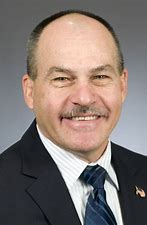by Dennis Dalman
An incumbent and a relative newcomer are competing to be elected to serve the people of Minnesota Senate District 13.
The incumbent is Sen. Jeff Howe (R-Rockville); his challenger is Michael Willemsen (DFL-Sauk Rapids). Senate District 13, covering parts of Stearns and Benton counties, includes the cities of Sartell, St. Joseph, Avon, Cold Spring, Paynesville and Sauk Rapids.
The winner of the race will be determined in the Nov. 3 general election.
The following are profiles of the two candidates:
Howe
Howe was chosen in a special election in 2018, over contender Joe Perske (DFL-Sartell), to serve in his current seat in the state legislature. Former Sen. Michelle Fischbach (R-Paynesville) had been a longtime legislator for that senate district, but two years ago she became the state’s lieutenant-governor and so resigned from her senate seat.
Before his 2018 special-election victory, Howe had served in the Minnesota House, representing residents who live in House District 13A.
Raised on a farm near Chokio, Howe is a retired small-business consultant who has a long military career. In 2017, he retired as a lieutenant colonel after serving for many years in the Minnesota National Guard. He was also a major in the U.S. Navy, worked as an avionics technician aboard the U.S.S. Kitty Hawk and was deployed to Iran during the Iranian American hostage crisis (1979). Years later, he was deployed twice to Iraq and earned two bronze stars.
Howe earned a bachelor’s degree in elective studies from St. Cloud State University and served for nearly 30 years as a volunteer firefighter for the Rockville Fire Department. He and his wife, Sheri, have four grown children.
In the Minnesota Senate, Howe serves on the following committees: Environment and Natural Resources Policy and Legacy Finance; State Government Finance and Policy; Transportation Finance and Policy; Elections; and Taxes. He has authored or co-authored many bills during his time in both the House and Senate, especially legislation regarding transportation, public safety and veterans’ issues.
In the Senate, Howe joined other Republicans in unsuccessful efforts to end Gov. Tim Walz’s executive emergency powers, maintaining such powers upset the balance among the branches of government. He has also criticized the governor and Democrats for how they dealt with the riots in Minneapolis after the death of George Floyd and criticized the governor for what Howe termed “disrespectful” remarks toward National Guard members.
Howe served on the oversight committee examining the Minneapolis riots and lawlessness in general. He supports what he calls “common-sense” police reforms but strongly opposes any de-funding of police departments.
Howe, who describes himself as a “pro-life conservative,” emphasizes the qualities of personal responsibility, duty, commitment and integrity. He supported pandemic-relief funds for companies and employees, particularly for food-handling industries. He also is trying to strengthen the State Trooper program, which has had trouble recruiting new troopers – mainly, Howe, said because of noncompetitive wages.
He is strongly in favor of the efforts to re-open schools safely with a combination of in-class sessions with safety precautions and distance learning or some hybrid of the two.
Willemsen
In 2016, Willemsen of Sauk Rapids ran against Sen. Michelle Fischbach for Senate District 13 but lost to her by a nearly 2-1 margin.
Willemsen was a site supervisor for a group home. More recently, he began working as an eligibility specialist for Benton County Human Services, helping financially-challenged people apply for and obtain services.
He describes himself as an optimist with socialist values who has strong faith in the innate intelligence of people.
His campaign slogan is “Keep Minnesota Nice.” Among his campaign pledges and legislative goals are the following:
Build an economy that works for all Minnesotans, not just the wealthy few. A level playing field, he said, would provide everyone an opportunity for success.
Invest more in families and schools.
Increase local government aide to help lower property taxes.
Support and strengthen labor unions.
Work for racial equality, equality for LGBTQ people, women’s rights, a woman’s reproductive rights and strong family planning.
Making higher education more affordable.
Create jobs by investing in infrastructure and increase broadband access in rural areas.
A renewed focus on ending poverty.
Change what he calls the “inherent inequities” within the criminal-justice system.
Legalize marijuana and expunge the records of those who have been arrested and/or incarcerated due to marijuana-related laws.
Work to create a comprehensive mental-health care system.
Make a single-payer health-care program with universal access, affordable for all.
Support small businesses and do not tax them.
End subsidies for industrial agriculture.
Increase the minimum wage to at least $15 per hour.
Make childcare more affordable.
Pass a statewide tenants’ bill of rights.
Advocate to encourage plant-based diets and less or no consumption of meats.
Work to create renewable energy, “green jobs and a progressive strategy to deal with climate change in Minnesota and elsewhere.
“We are the land of 10,000 lakes and we need to provide clean water for future generations,” Willemsen said.

Jeff Howe

Michael Willemsen


